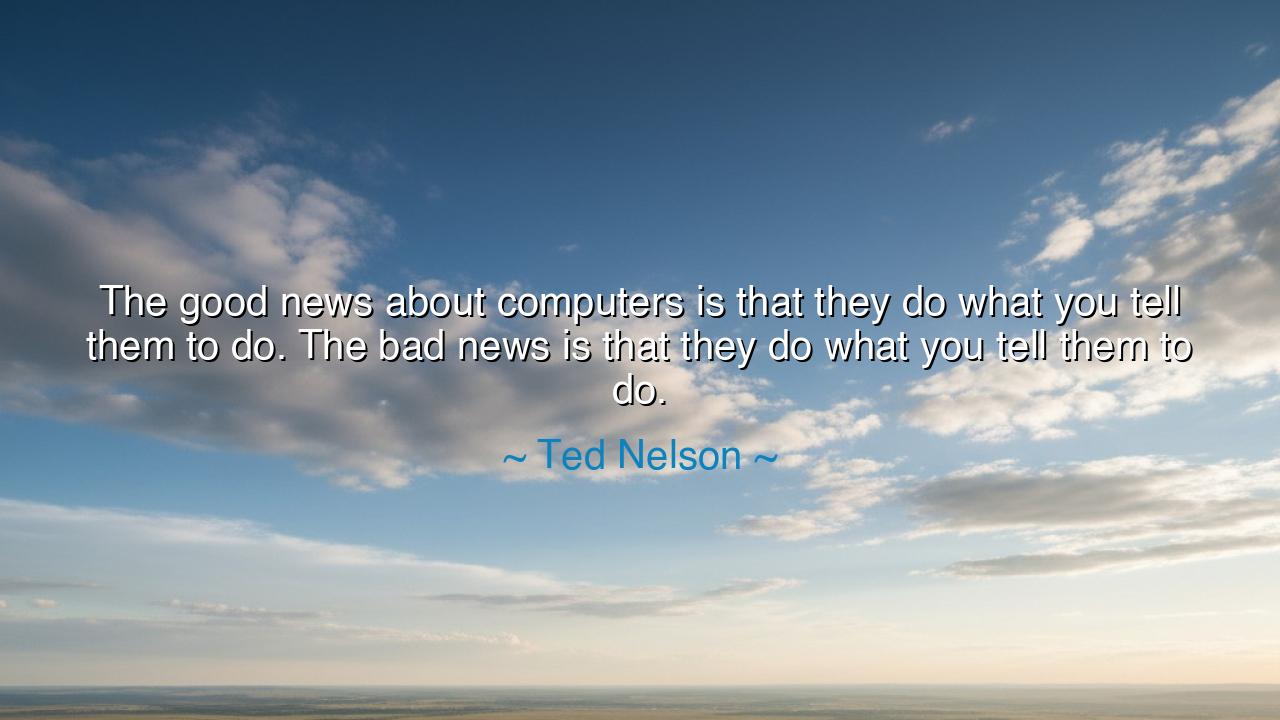
The good news about computers is that they do what you tell them
The good news about computers is that they do what you tell them to do. The bad news is that they do what you tell them to do.






Ted Nelson’s words, “The good news about computers is that they do what you tell them to do. The bad news is that they do what you tell them to do,” contain a profound paradox that captures the very essence of technology in our modern age. On one hand, computers are incredibly powerful tools, capable of performing tasks with precision and speed that far exceed the capacity of the human mind. Yet, as Nelson points out, there lies a danger in this dependence: the machine follows instructions blindly, without the wisdom or discretion that a human being would exercise in similar circumstances. In this seemingly innocuous statement, Nelson reveals the dual nature of technology—its ability to serve us and, simultaneously, its potential to mislead us when we fail to guide it with intelligence and foresight.
The ancients were keenly aware of the risks of unchecked power. In the Greek myths, gods and mortals alike wielded great power, but this power often came with consequences. Take the myth of King Midas, who was granted the ability to turn anything he touched into gold. At first, this seemed like a gift, but soon Midas realized that the power he had received was a curse—his food, his family, and even his own body turned to gold, leaving him a prisoner of his own wish. Midas’s story speaks to the danger of power without wisdom, and it mirrors the computer’s paradox: it does exactly what you tell it to do, but it lacks the ability to understand the consequences of those actions. The ancient wisdom here is clear: without guidance, even the most powerful tools can lead to destruction.
Plato, in his Republic, emphasized the importance of the philosopher-king—a ruler who, like a masterful mind, would guide society with reason and virtue. A ruler with such wisdom would ensure that their power was used justly, considering the long-term consequences of their actions. Similarly, computers are like powerful rulers of our digital world—they follow orders without questioning. But it is up to us, the creators and users of these tools, to ensure they are guided by wisdom, foresight, and intelligence. Nelson’s quote reminds us that technology is not neutral; it is a reflection of the intentions and limitations of those who wield it.
One can look to the Industrial Revolution as a powerful example of this dual-edged sword. The advent of machines and factories brought about unprecedented efficiency, but also led to exploitation, pollution, and the rise of unseen social inequalities. The machine, much like the computer, did what it was told, but its effects were not always beneficial. The factory owners saw progress, but the workers, trapped in grueling conditions, saw suffering. This reflects Nelson’s warning: the machine’s unquestioning nature can bring about results that are far from ideal unless carefully guided by human discernment.
In today’s world, we are witnessing a similar dynamic with the rise of artificial intelligence and machine learning. Computers can now analyze data, predict outcomes, and even make decisions. Yet, like the machines of the past, they do so without understanding. Consider the example of autonomous vehicles: these cars are programmed to follow certain algorithms to prevent accidents and ensure safety. However, what happens when an algorithm encounters an unexpected situation? The car will simply follow the instructions it has been given—no matter how imperfect they may be. As Nelson implies, this is both the good news and the bad news: the machine follows orders, but it cannot think beyond its programming.
The ancients also cautioned us about the dangers of blind obedience to systems, whether they were gods, kings, or laws. In Homer's Odyssey, Odysseus’ crew follows their orders to sail past the island of the Sirens, whose song promises death and destruction. But it is Odysseus’ wisdom—not just the obedience to commands—that saves them. Just as Odysseus must navigate the dangers of his journey with careful decision-making, so too must we guide our digital technologies with wisdom and awareness. The computer, much like the Sirens, can appear to be a tool of progress, but without discernment, it may lead us into perilous waters.
Lesson for the ages:
The power of the computer is undeniable, but its true potential lies in the human mind that guides it. Just as the ancients understood that power, whether wielded by gods or mortals, must be accompanied by wisdom and foresight, so too must we recognize that technology is not simply a tool—it is a reflection of our intentions. It can do great things, but it can also do harm if left unchecked. We must wield technology with great care, recognizing that it is the mind, not the machine, that must always be in control.
Practical Action:
As you interact with technology, remember the lesson of Nelson’s words. Use the computer and all its capabilities to enhance your understanding of the world, but always guide it with your wisdom, ethics, and humanity. In an age where machines can calculate, analyze, and predict, it is more important than ever to remain vigilant, to ask questions, and to never surrender your judgment to the machines you create. Like Odysseus, be the captain of your journey, guiding the tools at your disposal to a safe harbor—where progress and wisdom can coexist.






AAdministratorAdministrator
Welcome, honored guests. Please leave a comment, we will respond soon